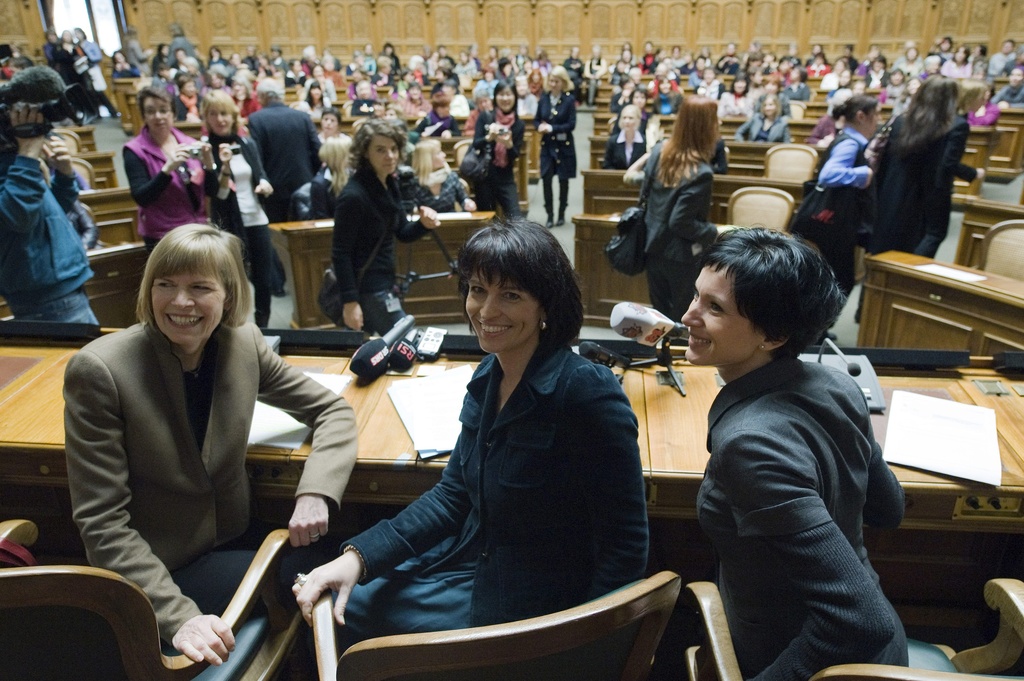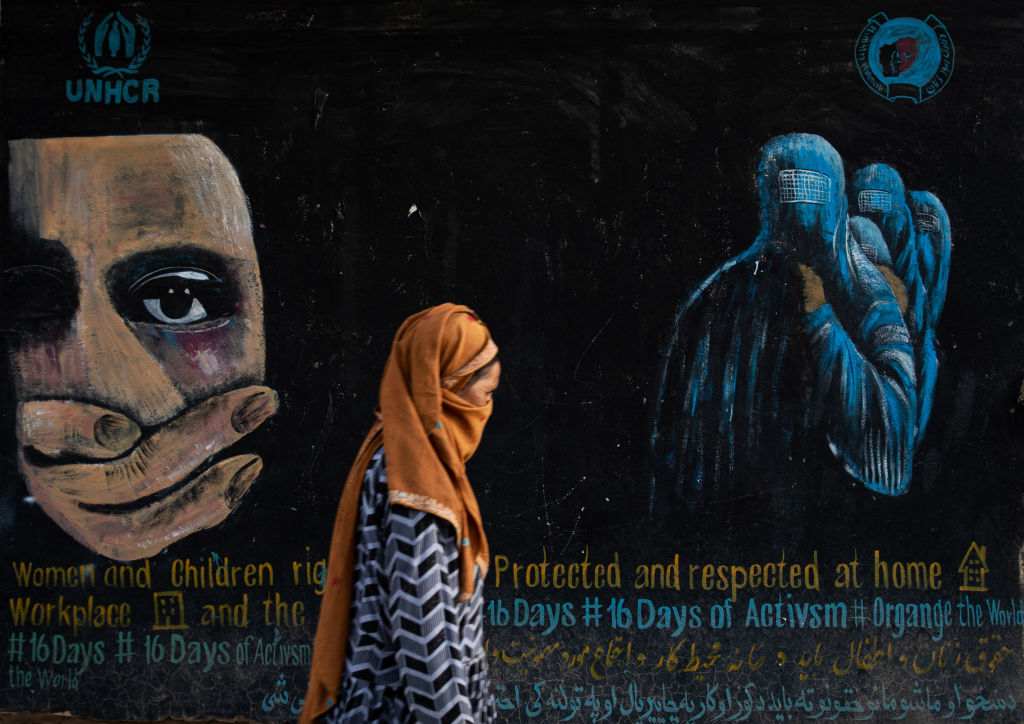
Women push for equal voice in election

With the October elections approaching, a major campaign has been launched to get more women elected to parliament.
It’s the first joint project by Swiss women’s umbrella organisations that targets the federal elections and calls on voters to choose more female candidates.
“The autumn elections must lead to a clear rise in the number of women in parliament,” said campaigners.
Flyers with a smiling man giving the campaign the thumbs up are being distributed in the coming month.
The initiative, “Women for the future”, also calls on political parties to take steps to increase their nominations of women candidates in the future and for the media to play their part by employing more women and preventing negative stereotyping of women in politics.
The organisations behind the campaign said although there was a female majority in the Swiss cabinet this year, it was a different story in cantonal level politics. In the 2010 parliamentary make-up, women accounted for 30 per cent of the House of Representatives’ seats, while in the Senate it was even less at 20 per cent.
Around half of the current female parliamentarians have written testimonials on why it is important that women have a chance to express themselves in politics, all of which have been published on the campaign website.
The campaigners also hope the message will reach the rightwing and centrist parties, where women’s representation is strikingly low.
Switzerland’s biggest political party, the Swiss People’s Party, has women in just five of its 66 parliamentary seats. Among leftwing and Green parties however, the gender balance is almost 50/50.
“The rightwing [representation] is really unbelievable. There’s a problem,” Etiennette Verrey, president of the Federal Commission for Women’s Issues, told swissinfo.ch at the campaign launch in Bern.
Three obstacles
To add weight to the campaign, an 80-page study, “Swiss politics, white on black”, was also presented detailing the obstacles facing women in politics.
Political scientist Regula Stämpfli was commissioned by women’s organisations to conduct the study. As a starting point she used the results of a 2010 survey of pro-women policies among national and cantonal chapters of political parties – which in itself had a poor showing with 29 responses sent from among 150 secretariats.
Stämpfli’s study found that only parties with pro-women policies saw female parliamentarian numbers grow. She also identified three main obstacles in general as preventing women from being elected: women not being mobilised to take part in politics and vote, the “institutionalised” failure of parties to nominate women, and the actual election of fewer women than men candidates.
She says men overcome these hurdles whatever their age, party, appearance or job.
Among Stämpfli’s conclusions are that clichés of women are being reinforced and research into the subject of equality in politics usually starts out from a negative perspective. She points to National Science Foundation studies on whether women are interested in politics or why fewer women participate in elections than men.
“Absolute rubbish,” Stämpfli told swissinfo.ch. “Do we study this because it’s actually worth studying or is it because we want to promote clichés?”
Such research becomes a “self-fulfilling prophecy,” she said
Networking
The physical appearances of politicians – both men and women – have also become more important, the study found.
“Images are more important than arguments, the body is more important. We’ve had absurd scenes in Switzerland, which we’ve never seen in France or in England,” Stämpfli said.
She brings up the example of a stunt by a member of the women’s chapter of the Radical Party who posed topless with a black strip across her chest and a slogan calling for more women in top positions in the private and public sectors.
In launching the pre-election campaign, women’s organisations called for an adequate ratio of men to women in parliament. Everyone had to vote as well, they said. “Abstaining is also a political statement.”
Switzerland’s dismal women-to-men ratio in politics has already been criticised in the past by the United Nations Committee on the Elimination of Discrimination against Women.
Verrey said that by networking, women’s organisations should be able to help mobilise women to take part in politics. Stämpfli’s study did give an overview of the current issues, she added.
“We will have to analyse it and see if we can do something. There are many things that have to do with society, where can we influence it,” said Verrey.
“It’s only been 40 years that we have the women’s vote, it’s unbelievable but it is the way it is. In Switzerland it takes a very long time to do anything. It takes one step after another. And a big leap at the end.”
There are seven per cent more women candidates standing in elections in October than there were in 2007, according to provisional figures.
Five cantons are upping their female quotas: Geneva which has the most female candidates with 37%, followed by Jura.
Ticino, Solothurn and Schwyz all nominated more women than in 2007.
A number of cantons were below the Swiss national average (32.3%): Schaffhausen (19.2%), Graubünden (24%), Ticino (25.7%), Neuchâtel (28.6%), Valais (26.9%) and Fribourg (23.3%).
Five cantons do not have any women candidates: Appenzell Inner-Rhodes, Appenzell Outer-Rhodes, Obwalden, Nidwalden and Glarus.
No parties have absolute equal representation. The Greens have the highest with 48%, followed by the centre-left Social Democrats with 47%. The centre-right Christian Democrats have a third women, and the Radicals a quarter. The Swiss People’s Party has 18% women.
The organisations involved in the campaign, “Women for the future”, represent over a million women in Switzerland.
The campaign includes Alliance F, Protestant Women of Switzerland and Swiss League of Catholic Women, as well as umbrella associations representing women in agriculture, business and the public service
Their website includes testimonials by half of the women in parliament today, giving their views on why men and women should have the same chance to express themselves in public.

In compliance with the JTI standards
More: SWI swissinfo.ch certified by the Journalism Trust Initiative















![The four-metre-long painting "Sonntag der Bergbauern" [Sunday of the Mountain Farmers, 1923-24/26] had to be removed by a crane from the German Chancellery in Berlin for the exhibition in Bern.](https://www.swissinfo.ch/content/wp-content/uploads/sites/13/2025/12/01_Pressebild_KirchnerxKirchner.jpg?ver=a45b19f3)














You can find an overview of ongoing debates with our journalists here . Please join us!
If you want to start a conversation about a topic raised in this article or want to report factual errors, email us at english@swissinfo.ch.